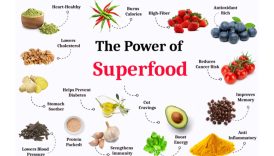Essential Supplements for a Balanced and Healthy Life

In today’s fast-paced world, maintaining a balanced diet can feel like a daunting challenge for many. With busy schedules and the convenience of processed foods, essential nutrients can easily fall to the wayside. This is where dietary supplements come into play, serving as a quick and effective way to bridge nutritional gaps.
- Essential Supplements for a Balanced and Healthy Life
- The Importance of Dietary Supplements
- Vitamin Supplements
- Vitamin D
- Vitamin B12
- Mineral Supplements
- Iron
- Magnesium
- Omega-3 Fatty Acids
- Benefits of Omega-3
- Best Sources of Omega-3
- Probiotics
- Gut Health
- Types of Probiotics
- Antioxidants
- Importance of Antioxidants
- Foods High in Antioxidants
- Protein Supplements
- Whey Protein
- Plant-Based Protein
- Herbal Supplements
- Ashwagandha
- Turmeric
- Fiber Supplements
- Soluble Fiber
- Insoluble Fiber
- Multivitamins
- Choosing the Right Multivitamin
- Benefits of Multivitamins
The Importance of Dietary Supplements
Supplements are designed to enhance one’s diet by providing necessary vitamins, minerals, and other beneficial compounds, ensuring overall well-being.
- Busy Lifestyles: Many individuals struggle to meet their nutritional needs through food alone, particularly those with hectic routines.
- Dietary Restrictions: Vegetarians, vegans, and individuals with food allergies might not receive adequate nutrients solely from their diets.
- Health Conditions: Certain medical conditions can lead to deficiencies that supplements can help alleviate.
By incorporating the right supplements into their daily regimen, people can support their health and vitality in a straightforward manner. The ensuing sections will delve into various types of supplements, highlighting their unique benefits and best sources.
Vitamin Supplements
As we dive deeper into the world of dietary supplements, one of the pivotal categories to explore is vitamin supplements. Vitamins play a crucial role in overall health, and certain vitamins are essential for maintaining energy levels, supporting the immune system, and optimizing bodily functions. Let’s take a closer look at two key vitamins: Vitamin D and Vitamin B12.
Vitamin D
Many people are unaware of the profound impact Vitamin D has on their health. Known as the “sunshine vitamin,” it is primarily obtained through sunlight exposure, but supplements can be a valuable alternative, especially during the winter months or for those living in less sunny climates. Here’s why Vitamin D is essential:
- Supports Bone Health: Aids in calcium absorption, crucial for maintaining strong bones.
- Boosts Immune Function: Helps the body fend off infections and diseases.
Vitamin B12
Vitamin B12 often garners attention, especially among those following a vegan or vegetarian diet. This vitamin is vital for energy production and helps in the formation of red blood cells. Personal experiences illustrate its importance; many who start B12 supplementation report a noticeable increase in energy levels. Important points to note include:
- Energy Production: Vital for converting food into energy.
- Nerve Health: Essential for maintaining the health of nerve cells and brain function.
Incorporating these vitamins into daily routines can significantly enhance one’s overall well-being. Now that we’ve covered vitamins, let’s explore the essential mineral supplements that can further support health.
Mineral Supplements
Following our exploration of essential vitamins, it’s equally important to discuss mineral supplements, which are vital to various bodily functions. Two significant minerals that deserve attention are iron and magnesium. Integrating these minerals into your diet can improve overall health and vitality.
Iron
Iron is a critical component for producing hemoglobin, a protein in red blood cells that transports oxygen throughout the body. Many individuals, particularly women during their reproductive years, may find themselves deficient in iron. Here’s why considering iron supplements could be beneficial:
- Energy Levels: Adequate iron boosts energy and reduces fatigue.
- Cognitive Function: Iron is essential for maintaining mental clarity and focus.
Sharing a personal story, a friend of mine, who often felt tired, discovered her iron levels were low. After taking an iron supplement, she noticed a remarkable improvement in her energy and mood.
Magnesium
Next up is magnesium, a mineral many individuals overlook despite its significance in sustaining health. This powerhouse mineral plays a role in over 300 biochemical reactions in the body. Here are some benefits:
- Muscle and Nerve Function: Magnesium helps muscles relax and improves nerve function.
- Sleep Quality: Adequate magnesium can promote better sleep and relaxation.
Many who start taking magnesium supplements report enjoying deeper sleep and waking up refreshed. By understanding the importance of these mineral supplements, individuals can make informed choices about enhancing their health. Next, we will explore Omega-3 fatty acids and their remarkable benefits for overall wellness.
Omega-3 Fatty Acids
After discussing crucial vitamins and minerals, we now turn our attention to Omega-3 fatty acids—essential fats that your body cannot produce on its own. These beneficial fatty acids are renowned for their impressive array of health benefits, making them a vital addition to any diet.
Benefits of Omega-3
Omega-3 fatty acids are associated with numerous health advantages, including:
- Heart Health: They help reduce triglycerides, lower blood pressure, and minimize the risk of heart disease.
- Brain Function: Omega-3s play a crucial role in enhancing memory and cognitive performance.
- Anti-Inflammatory Properties: They can help reduce inflammation, benefiting conditions such as arthritis.
A personal note: after incorporating Omega-3 supplements into my routine, I noticed a significant improvement in my overall mood and concentration levels, making daily tasks much more enjoyable.
Best Sources of Omega-3
It’s essential to consume adequate Omega-3 fatty acids from various sources. Some of the best include:
- Fatty Fish: Salmon, mackerel, and sardines are rich in Omega-3s and delicious options for meals.
- Chia Seeds: A great plant-based source, these seeds can be added to smoothies or yogurts.
- Walnuts: Snack on these heart-healthy nuts for an easy Omega-3 boost.
Incorporating these sources into your diet can significantly enhance health and well-being. Next, we’ll delve into probiotics and how they can support gut health.
Probiotics
Having explored the benefits of Omega-3 fatty acids, we now shift our focus to probiotics—often referred to as “good bacteria.” These live microorganisms are crucial for maintaining a healthy gut and supporting overall health. As the saying goes, “happy gut, happy life!”
Gut Health
A balanced gut flora is essential for various bodily functions, including digestion, nutrient absorption, and immune support. Probiotics can help:
- Enhance Digestion: They promote the growth of beneficial bacteria, aiding in the breakdown of food.
- Boost Immune System: A healthy gut microbiome can lead to a stronger immune response against illnesses.
- Reduce Symptoms of IBS: Many people find relief from gastrointestinal issues like bloating and gas after incorporating probiotics into their diet.
For example, after struggling with occasional digestive discomfort, adding a daily probiotic supplement made a noticeable difference in my gut health.
Types of Probiotics
Probiotics come in various forms, each offering unique benefits. Common types include:
- Lactobacillus: Often found in yogurt, this strain supports lactose digestion and can help with diarrhea.
- Bifidobacterium: This type thrives in the intestines and aids in breaking down complex carbs and fibers.
- Saccharomyces boulardii: A beneficial yeast that can help with antibiotic-associated diarrhea and support gut health.
Integrating these probiotics into your diet—whether through supplements or fermented foods—can significantly promote gut health. Next, we’ll discuss antioxidants and their crucial role in protecting our bodies.
Antioxidants
Transitioning from the benefits of probiotics, we now turn our attention to antioxidants, the superheroes in the battle against oxidative stress. These powerful compounds help protect our cells from damage caused by free radicals, which can contribute to chronic diseases and aging. Understanding their significance can empower individuals to make healthier dietary choices.
Importance of Antioxidants
Antioxidants play a crucial role in maintaining overall health, and their benefits include:
- Cell Protection: They neutralize free radicals, reducing the risk of cellular damage.
- Anti-Inflammatory Effects: Antioxidants can help decrease inflammation in the body, which is linked to numerous health conditions.
- Support Heart Health: By lowering oxidative stress, antioxidants can improve cardiovascular health and reduce cholesterol levels.
For instance, after incorporating more antioxidant-rich foods into my diet, I felt more energetic and noticed my skin looking healthier—proof that good nutrition has tangible effects!
Foods High in Antioxidants
To reap the benefits of antioxidants, it’s essential to include them in your diet. Some exceptional sources include:
- Berries: Blueberries, raspberries, and strawberries are packed with antioxidants and make a tasty snack.
- Dark Chocolate: A delightful treat that’s high in flavonoids, which function as antioxidants.
- Green Tea: Loaded with polyphenols, it’s a wonderful beverage choice that supports health.
Including these antioxidant-rich foods in daily meals can foster a healthier lifestyle. Next, we’ll explore protein supplements and their significance in nutrition.
Protein Supplements
Building on our discussion about antioxidants, let’s shift gears to protein supplements—a crucial aspect of maintaining good nutrition, especially for those who lead active lifestyles or want to enhance muscle recovery. Protein is essential for growth, repair, and overall body function, and supplements can offer a convenient way to meet daily needs.
Whey Protein
Whey protein is one of the most popular protein supplements available, particularly favored by athletes and fitness enthusiasts. Derived from milk during cheese production, its benefits include:
- Quick Absorption: Whey protein is rapidly absorbed by the body, making it ideal for post-workout recovery.
- Muscle Growth: It contains all essential amino acids, supporting muscle synthesis and repair.
I remember my workout sessions feeling more productive after incorporating whey protein into my post-exercise routine. It really helped with recovery and muscle building.
Plant-Based Protein
For those seeking an alternative to animal-derived products, plant-based proteins have gained substantial popularity. Options like pea, hemp, and brown rice protein can provide significant health benefits:
- Allergy-Friendly: They cater to those with lactose intolerance or dairy allergies.
- Rich in Nutrients: Many plant-based proteins are packed with additional nutrients and fiber.
Many of my friends have transitioned to plant-based protein powders and reported not only improved digestion but also steady energy levels throughout the day. Choosing the right protein supplement can greatly enhance nutritional intake and support personal health goals. Next, we’ll explore herbal supplements and their traditional uses.
Herbal Supplements
Having explored protein supplements, let’s now delve into the world of herbal supplements, which have been utilized for centuries in traditional medicine to support various aspects of health. Among the many options available, Ashwagandha and Turmeric are two standout herbs with impressive health benefits.
Ashwagandha
Ashwagandha, often referred to as the “Indian ginseng,” is renowned for its adaptogenic properties, helping the body manage stress. Here are some of its key benefits:
- Stress Reduction: It promotes a sense of calm and well-being, making it an excellent ally for those dealing with daily stresses.
- Improved Energy and Stamina: Users frequently report enhanced energy levels without the jitters associated with caffeine.
Personally, I noticed a significant decrease in my stress levels after incorporating Ashwagandha into my daily routine, allowing me to tackle challenges more effectively.
Turmeric
Next up is Turmeric, a golden-yellow spice praised for its active compound, curcumin, which offers a wealth of health benefits:
- Anti-Inflammatory Properties: Turmeric is well-known for its ability to reduce inflammation in the body, which can help alleviate symptoms of arthritis and other inflammatory conditions.
- Antioxidant Benefits: It supports overall health by combating oxidative stress, helping maintain cellular function.
In my experience, adding turmeric to my meals not only enhanced flavors but also contributed to an overall sense of well-being. Exploring herbal supplements can be a powerful way to boost health naturally. As we conclude this section, let’s transition to fiber supplements and their invaluable contributions to digestive health.
Fiber Supplements
With the knowledge of herbal supplements fresh in mind, let’s explore fiber supplements, which play an essential role in digestive health. Fiber is critical for maintaining gut function, regulating blood sugar levels, and promoting overall well-being. They come in two main types: soluble fiber and insoluble fiber.
Soluble Fiber
Soluble fiber dissolves in water and forms a gel-like substance. It’s renowned for its ability to help manage cholesterol and regulate blood sugar levels. Key benefits include:
- Heart Health: By lowering LDL cholesterol levels, soluble fiber can contribute to better cardiovascular health.
- Blood Sugar Control: It slows the absorption of sugar, helping to manage blood sugar levels, especially beneficial for those with diabetes.
After adding a soluble fiber supplement to my diet, I noticed an improvement in my digestion and energy levels, which felt really rewarding.
Insoluble Fiber
In contrast, insoluble fiber does not dissolve in water but adds bulk to the stool, aiding in regular bowel movements. Here’s why it’s important:
- Digestive Health: It helps prevent constipation and maintains gut health by promoting regularity.
- Weight Management: High-fiber meals keep you feeling full longer, which can assist in weight control.
Many people find that increasing their intake of insoluble fiber yields positive results in their digestive health. By incorporating both soluble and insoluble fibers into their diets, individuals can greatly enhance their overall digestive function. Now, let’s wrap up with a quick look at multivitamins and their role in supporting daily nutrition.
Multivitamins
Having covered fiber supplements and their importance, let’s shift our focus to multivitamins, which can serve as a convenient way to ensure comprehensive nutrient intake. In today’s fast-paced lifestyle, many individuals struggle to eat a balanced diet, making multivitamins a viable option to fill any nutritional gaps.
Choosing the Right Multivitamin
When selecting a multivitamin, it’s crucial to consider personal health needs and dietary restrictions. Here are some tips to help you choose wisely:
- Look for Whole Food Sources: Multivitamins derived from whole food sources often provide better absorption and additional nutrients.
- Check for Essential Nutrients: Make sure the multivitamin contains essential vitamins and minerals, such as Vitamin A, C, D, calcium, and magnesium.
- Be Mindful of Dosages: Ensure that dosages align with daily requirements to avoid any potential toxicity.
After doing a bit of research, I found a multivitamin tailored to my dietary preferences, which made me feel more assured in my nutrition.
Benefits of Multivitamins
Multivitamins offer several benefits, including:
- Nutritional Insurance: They act as a safety net, ensuring that you get the necessary vitamins and minerals even on days when your diet may lack variety.
- Increased Energy Levels: Many report feeling more energized and alert after regularly taking a multivitamin.
- Support Overall Health: Regular intake can reinforce immune function and promote general well-being.
Incorporating a multivitamin into one’s daily routine can significantly enhance overall health, especially when paired with a balanced diet. With all these supplement options explored, individuals can better navigate their nutritional needs and support a healthy lifestyle.





